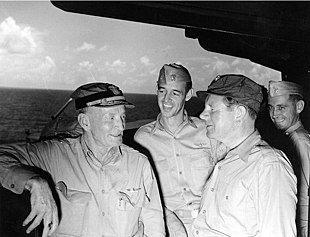John L. Sullivan (politician, 1899)
John Lawrence Sullivan (born June 16, 1899 in Manchester , New Hampshire , † August 8, 1982 in Exeter , New Hampshire) was an American politician ( Democratic Party ), who served from 1949 to 1951 as Secretary of State for the United States.
Lawyer and politician
John Sullivan was the son of a cigar manufacturer who also worked as a lawyer. After finishing school he attended Dartmouth College in Hanover , where he earned a reputation as a good speaker. In 1923 he was inducted into the New Hampshire Bar; the following year he received a Bachelor of Laws from Harvard Law School . He then joined his father's office in Manchester. In 1929 he was elected as a Democratic candidate for Hillsborough County Attorney General. He later ran his own legal practice under the name Sullivan & Sullivan .
In 1934 Sullivan applied for a political office for the first time: He ran for governor of New Hampshire and, with 49.16 percent of the vote, was very narrowly defeated by Republican Styles Bridges , who received 50.55 percent. Four years later he made another attempt to reach the highest post in the state, but this time clearly failed. The Republican incumbent Francis P. Murphy was confirmed with 57.1 percent of the vote, Sullivan came with 42.8 percent.
Washington career
Sullivan went to Washington in 1939 , where he initially worked as assistant to the Commissioner of Internal Revenue . After serving in this office for three months, he was named Deputy Treasury Secretary by US President Franklin D. Roosevelt . In this role he gained nationwide fame over the next five years. For his services to the ministry, he was awarded the Distinguished Service Award in 1947 .
Shortly before the end of World War II , Sullivan's appointment as Assistant Secretary of the Navy took place on July 5, 1945 with responsibility for naval aviation . On June 17, 1946 he was promoted to Under Secretary of the Navy , which he held the second highest rank of the authority after Minister James V. Forrestal . When he was appointed head of the new Department of Defense on September 19, 1947 , Sullivan succeeded him as Secretary . This was no longer a cabinet post , however , as the Department of the Navy had become a sub-agency of the new ministry.
Sullivan's term of office ended abruptly with his resignation on May 24, 1949. The occasion was a conflict with the new Secretary of Defense Louis A. Johnson , who had stopped the project of the planned new aircraft carrier USS United States . The protest against the policies of Johnson, which was close to the Air Force , became known as the " Uprising of the Admirals ". In a letter to the minister, Sullivan said he was "extremely disturbed by the first attempt ever made in this country to prevent the development of a powerful new weapon".
After his resignation, Sullivan worked again as a lawyer and was also active in the Democratic Party. He was one of the supporters of another term of office for President Harry S. Truman , who then did not run for the 1952 election. In the run-up to the 1976 presidential election , he supported the candidacy of US Senator Henry M. Jackson , who ultimately had to leave the nomination to Jimmy Carter . Sullivan was also active as a businessman; he was a member of the governing bodies of the Brown Company , the Martin Marietta Corporation and the National Savings and Trust . He died in Exeter in 1982 and was buried in Arlington National Cemetery.
Individual evidence
Web links
- John L. Sullivan in the database of Find a Grave (English)
| personal data | |
|---|---|
| SURNAME | Sullivan, John L. |
| ALTERNATIVE NAMES | Sullivan, John Lawrence (full name) |
| BRIEF DESCRIPTION | American politician |
| DATE OF BIRTH | June 16, 1899 |
| PLACE OF BIRTH | Manchester , New Hampshire |
| DATE OF DEATH | August 8, 1982 |
| Place of death | Exeter , New Hampshire |
